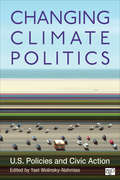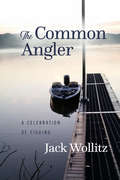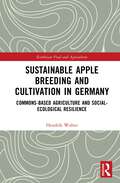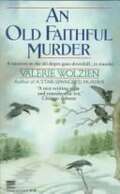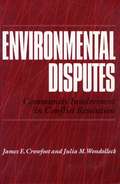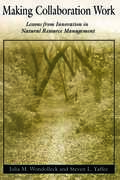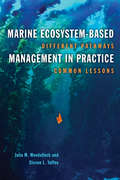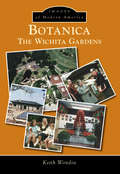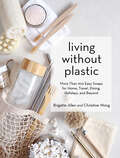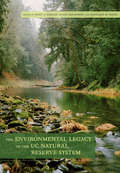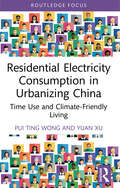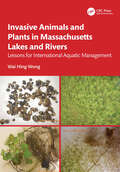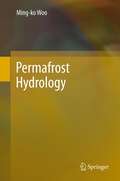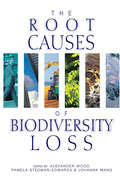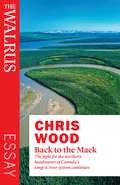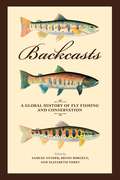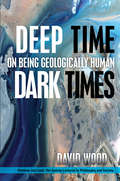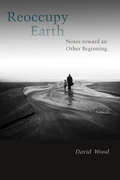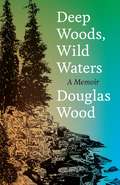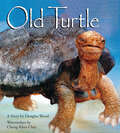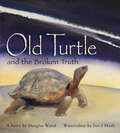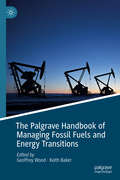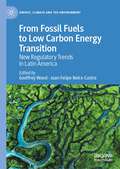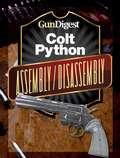- Table View
- List View
Changing Climate Politics: U.S. Policies and Civic Action
by Yael Wolinsky-NahmiasChanging Climate Politics provides a comprehensive account of the current state of government action and political participation in the United States on the issue of climate change. The book evaluates the role of the federal government, the courts, states, and cities in tackling the problems created by climate change, offering an inclusive and balanced assessment of progress and challenges. The book further explores the growing role of civic society in climate action plans, analyzing public opinion, the U.S. climate movement, policy making through ballot measures, consumer action, and the prospect of a social transformation toward a more sustainable society. This timely volume examines new approaches to policies and civic action on climate change addressing critical questions about the responsibilities and obligations of governments and citizens.
Changing Climate Politics: U.S. Policies and Civic Action
by Yael Wolinsky-NahmiasChanging Climate Politics provides a comprehensive account of the current state of government action and political participation in the United States on the issue of climate change. The book evaluates the role of the federal government, the courts, states, and cities in tackling the problems created by climate change, offering an inclusive and balanced assessment of progress and challenges. The book further explores the growing role of civic society in climate action plans, analyzing public opinion, the U.S. climate movement, policy making through ballot measures, consumer action, and the prospect of a social transformation toward a more sustainable society. This timely volume examines new approaches to policies and civic action on climate change addressing critical questions about the responsibilities and obligations of governments and citizens.
The Common Angler: A Celebration of Fishing
by Jack WollitzThe Common Angler taps into the passion that simmers in the souls of anglers and celebrates the primordial connection of people to fish and fishing. Author Jack Wollitz set out to explain the "why" behind the fact that so many people are passionate about fishing and along the way discovered a book's worth of experiences and stories. Early chapters cover the foundation of Jack's own passion for fishing and explore the connection we have with water and the creatures that depend on it for life. The Common Angler explores fishing friendships, relationships, and observations; extraordinary experiences; and the value of personal time on the water. Also included is a whimsical piece that personifies two common waterside fixtures. A key chapter draws parallels between the legendary River Lea in Izaak Walton's The Compleat Angler, written in the mid-seventeenth century, and Northeast Ohio's Mahoning River and the mighty Ohio River. The Common Angler also provides an insider's perspective about what makes certain people great anglers, featuring two Northeast Ohio men known for their fishing accomplishments, as well as Ernest Hemingway, baseball stars Ted Williams and Wade Boggs, and Rick Clunn, considered the greatest bass angler of all time. The book advances with chapters that explore the development and popularity of competitive fishing, the therapeutic value of fishing when times are difficult, and even the pain and suffering dedicated anglers sometimes endure. The Common Angler concludes with an examination of the obligations anglers shoulder and how we can grow with our passion. "Next time you go to the water, open your eyes wider than ever before. Listen like your ears are amplifiers. Breathe with a purpose, deep and slow, so every molecule of nature checks in with your brain. Feel the sun. Touch the water. Ask yourself why you are there and what you intend to accomplish. Do this and you will be fishing. Do it every time and you will open a new chapter in your life as an angler."
Sustainable Apple Breeding and Cultivation in Germany: Commons-Based Agriculture and Social-Ecological Resilience (Earthscan Food and Agriculture)
by Hendrik WolterApplying a socio-ecological framework, this book explores how the innovative approach of commons-based organic apple breeding can contribute to sustainability in agricultural and food systems more widely. As fruit breeding and cultivation systems are confronted with a range of sustainability challenges, there are calls for new and innovative breeding approaches beyond mainstream economic solutions that would mitigate these sustainability challenges. Apples, in particular, are facing serious environmental challenges, with the negative environmental impacts of modern conventional breeding and farming, loss of agrobiodiversity, low participation and diminishing diversity of market actors in the wake of privatization and economization trends result in a lack of resilience in current breeding and cultivation systems. Drawing on in-depth case study research on apple production in Germany, this book advances the innovative solution of commons-based apple breeding as a model for developing resilience in fruit breeding and cultivation. It analyzes this approach, comparing it with more conventional practices, and showcases which factors could inhibit the broad implementation of commons-based apple breeding and how they can be overcome to exploit its full potential. Contributing to the great ambition of finding sustainable solutions across all agricultural sectors, this book opens up new and interdisciplinary perspectives on fruit breeding and cultivation, which is a largely neglected issue in contemporary discussions on agriculture and food production. This book will be of great interest for students and scholars from the fields of sustainable food systems, sustainable agriculture, crop science, and resource management and in particular those that seek inspiration for innovative approaches rooted in sustainability research, social-ecological resilience, and the commons.
An Old Faithful Murder (Susan Henshaw Mystery #5)
by Valerie WolzienMURDER IS A FAMILY AFFAIR. The Henshaw family vacation to Yellowstone National Park promised two fun-filled weeks of fantastic scenery, great skiing, and sightseeing. Best of all, Susan's two teenagers found buddies in the Ericksen clan, who'd gathered at the lodge for their first family reunion. But there's trouble brewing among the Ericksens. A stuffed dummy dressed like the domineering patriarch is found sprawled by Old Faithful. A practical joke; obviously. But no one is laughing when the real murdered body of George Ericksen is found in the-same spot. When her reputation for solving murder cases in her Connecticut suburb is revealed, Susan is asked to find the killer. A web of twisted emotions and buried family secrets quickly unfolds, and Susan discovers everyone had reason to kill George. But who hated him enough to resort to murder at a world-famous resort? Well over half of the books in the Susan Henshaw Mystery series are ready for you in Bookshare's library with the rest on the way. Susan is the quintessential upper middle class housewife with the latest and greatest in brand name appliances, accessories and clothing to prove it. With the home front well in hand she is always poised and ready when her path intersects with murder to apply her social, domestic and other talents to solving the crimes. Look for: #1 Death at a PTA Luncheon, #2 The Fortieth Birthday Body, #3 We Wish You A Merry Murder, #4 All Hallows' Evil, #6 A Star Spangled Murder, #11 Weddings are Murder, #13 Death At A Discount, #14 An Anniversary To Die For, #15 Death in a Beach Chair and #16 Death in Duplicate.
Environmental Disputes: Community Involvement In Conflict Resolution (Environment, Development And Public Policy: Environmental Policy And Planning Ser.)
by Julia M. Wondolleck James CrowfootEnvironmental Disputes helps citizen groups, businesses, and governments understand how Environmental Dispute Settlement--a set of procedures for settling disputes over environmental policies without litigation--can work for them.
Making Collaboration Work: Lessons From Innovation In Natural Resource Management
by Julia M. Wondolleck Steven Lewis YaffeeAcross the United States, diverse groups are turning away from confrontation and toward collaboration in an attempt to tackle some of our nation's most intractable environmental problems. Government agencies, community groups, businesses, and private individuals have begun working together to solve common problems, resolve conflicts, and develop forward-thinking strategies for moving in a more sustainable direction.Making Collaboration Work examines those promising efforts. With a decade of research behind them, the authors offer an invaluable set of lessons on the role of collaboration in natural resource management and how to make it work. The book: explains why collaboration is an essential component of resource management describes barriers that must be understood and overcome presents eight themes that characterize successful efforts details the specific ways that groups can use those themes to achieve success provides advice on how to ensure accountability Drawing on lessons from nearly two hundred cases from around the country, the authors describe the experience in practical terms and offer specific advice for agencies and individuals interested in pursuing a collaborative approach. The images of success offered can provide ideas to those mired in traditional management styles and empower those seeking new approaches. While many of the examples involve natural resource professionals, the lessons hold true in a variety of public policy settings including public health, social services, and environmental protection, among others.Making Collaboration Work will be an invaluable source of ideas and inspiration for policy makers, managers and staff of government agencies and nongovernmental organizations, and community groups searching for more productive modes of interaction.
Marine Ecosystem-Based Management in Practice: Different Pathways, Common Lessons
by Julia M. Wondolleck Steven Lewis YaffeeWhat are the key ingredients of successful marine ecosystem planning? The surprising answer, according to authors Julia Wondolleck and Stephen Yaffee, is that a successful approach calls for more than just sound organizational structure and resources, but also a comfortable atmosphere of trust, understanding, and collaboration.Marine Ecosystem-Based Management in Practice is the first practical guide for the marine conservation realm. In a unique collection of case studies, the authors showcase successful collaborative approaches to ecosystem-based management. This book offers a hopeful message to policy makers, managers, practitioners, and students who will find this an indispensable guide to field-tested, replicable marine conservation management practices that work.
Botanica: The Wichita Gardens
by Keith WondraGrowing from 4 gardens in 1987 to 29 in 2015, Botanica, The Wichita Gardens has become a regional attraction. The dream of a botanical garden in Wichita started in the early 1970s with John Firsching, superintendent of landscape and forestry with the Board of Park Commissioners, and in 1987 the gardens opened on the site of Wichita's Sim Park. Images of Modern America: Botanica, The Wichita Gardens tells the story of the people, events, and stories that have shaped Botanica into Wichita's garden. Included are images of Botanica throughout the gardens' 28-year history and the earlier history of Sim Park, many of which have never been published before.
Living Without Plastic: More Than 100 Easy Swaps for Home, Travel, Dining, Holidays, and Beyond
by Christine Wong Brigette Allen“An eye-opening guide on how to lessen one’s dependence on plastics. . . . This is a clarion, convincing wake-up call to the scope of the global plastic problem and what readers can do about it. —Publishers Weekly <P><P>Embrace a plastic-free lifestyle with more than 100 simple, stylish swaps for everything from pens and toothbrushes to disposable bottles and the 5 trillion plastic bags we use—and throw out—every year. Use a natural loofah, not a synthetic sponge Buy milk in glass bottles or make homemade nut milk Opt for a waste-free shampoo bar Skip the printed receipt and opt for an email instead Wrap gifts beautifully with cloth <P><P>Organized into five sections—At Home, Food & Drink, Health & Beauty, On the Go, and Special Occasions—Living Without Plastic is a cover-to-cover collection of doable, difference making solutions, including a 30-Day Plastic Detox Program.
The Environmental Legacy of the UC Natural Reserve System
by Kathleen M. Wong Peggy L. Fiedler Susan Gee RumseyThe UC Natural Reserve System, established in 1965 to support field research, teaching, and public service in natural environments, has become a prototype of conservation and land stewardship looked to by natural resource managers throughout the world. From its modest beginnings of seven sites, the UC NRS has grown to encompass more than 750,000 wildland acres. This book tells the story of how a few forward-thinking UC faculty, who'd had their research plots and teaching spots destroyed by development and habitat degradation, devised a way to save representative examples of many of California's major ecosystems. Working together with conservation-minded donors and landowners, with state and federal agencies, and with land trusts and private conservation organizations, they founded what would become the world's largest university-administered natural reserve system--a legacy of lasting significance and utility. This lavishly illustrated volume, which includes images by famed photographers Ansel Adams and Galen Rowell, describes the natural and human histories of the system's many reserves. Located throughout California, these wildland habitats range from coastal tide pools to inland deserts, from lush wetlands to ancient forests, and from vernal pools to oak savannas. By supporting teaching, research, and public service within such protected landscapes, the UC NRS contributes to the understanding and wise stewardship of the Earth.
Residential Electricity Consumption in Urbanizing China: Time Use and Climate-Friendly Living (Routledge Focus on Energy Studies)
by Pui Ting Wong Yuan XuThis book forges a link between residential CO2 emissions and time use, focussing on China as a key case study. To provide a better understanding of the energy implications of the lifestyle differences between urban and rural China, Pui Ting Wong and Yuan Xu utilise time-use methodology as an alternative way to explore the links between individual lifestyle and residential electricity consumption. They begin by examining how Chinese citizens divide their time between daily activities, highlighting patterns around indicators including age, gender, education, and economic status. They go on to quantify CO2 intensities of these time-use activities. Through this linkage, this book presents an alternative strategy for climate-friendly living, highlighting the ways in which urban planning can be deployed to help individuals adapt their time-use patterns for CO2 mitigation. Providing a novel contribution to the growing literature on residential electricity consumption, Residential Electricity Consumption in Urbanizing China will be of great interest to scholars of climate policy, energy studies, time use, and urban planning.
Invasive Animals and Plants in Massachusetts Lakes and Rivers: Lessons for International Aquatic Management
by Wai Hing WongThere is a growing demand for appropriate management of aquatic invasive species in lakes and rivers worldwide. This book covers biology, invasion ecology, sightings, and control techniques of 4 invasive animals and 15 invasive plants in Massachusetts lakes and rivers. It provides valuable information on their biological characteristics and potential expansion pathways, as well as monitoring and management, including alternative management tools using updated biological, chemical, and mechanical methods. The book also includes the regulation of invasive species management to allow resource managers, biologists, practitioners, volunteers, and students a better understanding of compliance and enforcement with environmental law. An example of successful management is highlighted for each invasive species. Invasive Animals and Plants in Massachusetts Lakes and Rivers is the first book to provide comprehensive and systematic coverage and illustrations for both freshwater invasive animals and plants. Although focussing on Massachusetts, it will provide readers with the bigger picture on multiple invasive species, from prevention, early detection, control, ecological restoration, to public education. Natural resource managers in Massachusetts and surrounding states will glean the detailed and valuable information they need to learn and use to prevent and manage freshwater invasive species in the field.
Permafrost Hydrology
by Ming-Ko WooPermafrost Hydrology systematically elucidates the roles of seasonally and perennially frozen ground on the distribution, storage and flow of water. Cold regions of the World are subject to mounting development which significantly affects the physical environment. Climate change, natural or human-induced, reinforces the impacts. Knowledge of surface and ground water processes operating in permafrost terrain is fundamental to planning, management and conservation. This book is an indispensable reference for libraries and researchers, an information source for practitioners, and a valuable text for training the next generations of cold region scientists and engineers.
The Root Causes of Biodiversity Loss
by Alexander Wood Pamela Stedman-Edwards Johanna MangThe world is losing species and biodiversity at an unprecedented rate. The causes go deep and the losses are driven by a complex array of social, economic, political and biological factors at different levels. Immediate causes such as over-harvesting, pollution and habitat change have been well studied, but the socioeconomic factors driving people to degrade their environment are less well understood. This book examines the underlying causes. It provides analyses of a range of case studies from Brazil, Cameroon, China, Danube River Basin, India, Mexico, Pakistan, Philippines, Tanzania and Vietnam, and integrates them into a new and interdisciplinary framework for understanding what is happening. From these results, the editors are able to derive policy conclusions and recommendations for operational and institutional approaches to address the root causes and reverse the current trends. It makes a contribution to the understanding of all those - from ecologists and conservationists to economists and policy makers - working on one of the major challenges we face.
Back to the Mack
by Chris WoodBack to the Mack is an ebook by award-winning journalist and author Chris Wood. It contains his seminal story about the Mackenzie River, "The Last Great Water Fight," first featured in the October 2010 issue of The Walrus. The ebook also includes "Back to the Mack," in which Wood returns to the Mackenzie four years after his original story and chronicles the development of natural resources affecting both the river and the extensive ecosystems and communities it supports. These two articles also serve as companion content to the brand-new original documentary http://thewalrus.ca/cold-amazon, produced by the Walter and Duncan Gordon Foundation. Cold Amazon will be available to view for free as of March 17 at http://thewalrus.ca/cold-amazon.
Backcasts: A Global History of Fly Fishing and Conservation
by Chris Wood Jen Corrinne Brown Elizabeth Tobey Samuel Snyder Bryon Borgelt"Many of us probably would be better fishermen if we did not spend so much time watching and waiting for the world to become perfect."-Norman Maclean Though Maclean writes of an age-old focus of all anglers--the day's catch--he may as well be speaking to another, deeper accomplishment of the best fishermen and fisherwomen: the preservation of natural resources. Backcasts celebrates this centuries-old confluence of fly fishing and conservation. However religious, however patiently spiritual the tying and casting of the fly may be, no angler wishes to wade into rivers of industrial runoff or cast into waters devoid of fish or full of invasive species like the Asian carp. So it comes as no surprise that those who fish have long played an active, foundational role in the preservation, management, and restoration of the world's coldwater fisheries. With sections covering the history of fly fishing; the sport's global evolution, from the rivers of South Africa to Japan; the journeys of both native and nonnative trout; and the work of conservation organizations such as the Federation of Fly Fishers and Trout Unlimited, Backcasts casts wide. Highlighting the historical significance of outdoor recreation and sports to conservation in a collection important for fly anglers and scholars of fisheries ecology, conservation history, and environmental ethics, Backcasts explores both the problems anglers and their organizations face and how they might serve as models of conservation--in the individual trout streams, watersheds, and landscapes through which these waters flow.
Deep Time, Dark Times: On Being Geologically Human (Thinking Out Loud)
by David WoodThe new geological epoch we call the Anthropocene is not just a scientific classification. It marks a radical transformation in the background conditions of life on Earth, one taken for granted by much of who we are and what we hope for. Never before has a species possessed both a geological-scale grasp of the history of the Earth and a sober understanding of its own likely fate. Our situation forces us to confront questions both philosophical and of real practical urgency. We need to rethink who “we” are, what agency means today, how to deal with the passions stirred by our circumstances, whether our manner of dwelling on Earth is open to change, and, ultimately, “What is to be done?” Our future, that of our species, and of all the fellow travelers on the planet depend on it.The real-world consequences of climate change bring new significance to some very traditional philosophical questions about reason, agency, responsibility, community, and man’s place in nature. The focus is shifting from imagining and promoting the “good life” to the survival of the species. Deep Time, Dark Times challenges us to reimagine ourselves as a species, taking on a geological consciousness. Drawing promiscuously on the work of Nietzsche, Heidegger, Foucault, Derrida, Deleuze, and other contemporary French thinkers, as well as the science of climate change, David Wood reflects on the historical series of displacements and de-centerings of both the privilege of the Earth, and of the human, from Copernicus through Darwin and Freud to the declaration of the age of the Anthropocene. He argues for the need to develop a new temporal phronesis and to radically rethink who “we” are in respect to solidarity with other humans, and responsibility for the nonhuman stakeholders with which we share the planet. In these brief, lively chapters, Wood poses a range of questions centered on our individual and collective political agency. Might not human exceptionalism be reborn as a sort of hyperbolic responsibility rather than privilege?
Reoccupy Earth: Notes toward an Other Beginning (Groundworks: Ecological Issues in Philosophy and Theology)
by David WoodHabit rules our lives. And yet climate change and the catastrophic future it portends, makes it clear that we cannot go on like this. Our habits are integral to narratives of the good life, to social norms and expectations, as well as to economic reality. Such shared shapes are vital. Yet while many of our individual habits seem perfectly reasonable, when aggregated together they spell disaster. Beyond consumerism, other forms of life and patterns of dwelling are clearly possible. But how can we get there from here? Who precisely is the ‘we’ that our habits have created, and who else might we be? Philosophy is about emancipation—from illusions, myths, and oppression. In Reoccupy Earth, the noted philosopher David Wood shows how an approach to philosophy attuned to our ecological existence can suspend the taken-for-granted and open up alternative forms of earthly dwelling. Sharing the earth, as we do, raises fundamental questions about space and time, place and history, territory and embodiment—questions that philosophy cannot directly answer but can help us to frame and to work out for ourselves. Deconstruction exposes all manner of exclusion, violence to the other, and silent subordination. Phenomenology and Whitehead’s process philosophy offer further resources for an ecological imagination. Bringing an uncommon lucidity, directness, and even practicality to sophisticated philosophical questions, Wood plots experiential pathways that disrupt our habitual existence and challenge our everyday complacency. In walking us through a range of reversals, transformations, and estrangements that thinking ecologically demands of us, Wood shows how living responsibly with the earth means affirming the ways in which we are vulnerable, receptive, and dependent, and the need for solidarity all round.If we take seriously values like truth, justice, and compassion we must be willing to contemplate that the threat we pose to the earth might demand our own species’ demise. Yet we have the capacity to live responsibly. In an unfashionable but spirited defense of an enlightened anthropocentrism, Wood argues that to deserve the privileges of Reason we must demonstrably deploy it through collective sustainable agency. Only in this way can we reinhabit the earth.
Deep Woods, Wild Waters: A Memoir
by Douglas WoodWait, young Douglas’s grandfather says as the bobber twitches on the surface of Little Lake. Be patient. And so begins an encounter with the promise and wonder of nature that will last a lifetime. Deep Woods, Wild Waters traces the winding path that carried Douglas Wood from one wonder to the next, through a landscape of rocks, woods, and waters, with stops along the way for questions and reflections that link human nature to the larger mysteries of the natural world.Like life itself, the author’s way is not linear. One landmark leads back to a favorite campsite, another prompts him to consider the “gospel of rocks,” another launches him into the wilderness beyond the stars—a contemplation of time and space and humanity’s place in all of it. The creator of thirty-four books, including the classic Old Turtle, and an expert woodsman and wilderness canoe guide, Wood brings all his storytelling and bushwhacking skills to bear as he takes us hurtling down wild rapids, crossing stormy lakes, or simply navigating the treacherous currents and twisty trails of everyday life. A warm, generous, and knowing guide, Wood maps a journey that, as he says, “anyone can take, through a landscape anyone can know.” Turning the pages, hiking the portages, running the rapids, or scanning the wild country from high promontory, he invites us to say, in a soul-satisfying moment of recognition, “I know that place.”
Old Turtle
by Douglas WoodExperience the wisdom of Old Turtle, the bestselling fable that explores society, the environment, and the spirituality they share.Who is God?Is He a wind that is never still?Is He a rock that never moves?Is He high above or here among us?Venerable Old Turtle answers quietly: God is all of these things.Old Turtle first burst upon the publishing scene in 1992, and it was instantly recognized as a classic fable about ecology, peace, and the interconnectedness of all beings. Simple yet profound, it has since brought hope and inspiration to children and adults around the world.
Old Turtle and the Broken Truth
by Douglas WoodPowerhouse team Douglas Wood and Jon J Muth present a sequel to Old Turtle, the award-winning wisdom tale of peace and love for the earth.Seekers of all ages have been inspired by the stirring message of Old Turtle, the beloved, award-winning wisdom tale of peace. Now Old Turtle returns in a timeless story about love, acceptance, and the nature of truth.Long ago, as truth descended onto earth, it split in two: one piece landing among the people and the other blazing through the sky. When the people discover the piece of truth, it gives them strength and happiness. But over time, it turns them arrogant and greedy. They do not share their truth with others, wars rage on, and the earth begins to suffer. Then a Little Girl eager for change journeys to find Old Turtle, seeking the precious piece of wisdom that will mend the people's broken truth, making it -- and them -- whole once again.Douglas Wood's stirring and eloquent fable, soulfully illustrated in luminous watercolor by Jon J Muth, offers readers of all ages inspiration, hope, and a healing vision of peace.
The Palgrave Handbook of Managing Fossil Fuels and Energy Transitions
by Geoffrey Wood Keith BakerThis Handbook is the first volume to comprehensively analyse and problem-solve how to manage the decline of fossil fuels as the world tackles climate change and shifts towards a low-carbon energy transition. The overall findings are straight-forward and unsurprising: although fossil fuels have powered the industrialisation of many nations and improved the lives of hundreds of millions of people, another century dominated by fossil fuels would be disastrous. Fossil fuels and associated greenhouse gas emissions must be reduced to a level that avoids rising temperatures and rising risks in support of a just and sustainable energy transition. Divided into four sections and 25 contributions from global leading experts, the chapters span a wide range of energy technologies and sources including fossil fuels, carbon mitigation options, renewables, low carbon energy, energy storage, electric vehicles and energy sectors (electricity, heat and transport). They cover varied legal jurisdictions and multiple governance approaches encompassing multi- and inter-disciplinary technological, environmental, social, economic, political, legal and policy perspectives with timely case studies from Africa, Asia, Australia, Europe, North America, South America and the Pacific. Providing an insightful contribution to the literature and a much-needed synthesis of the field as a whole, this book will have great appeal to decision makers, practitioners, students and scholars in the field of energy transition studies seeking a comprehensive understanding of the opportunities and challenges in managing the decline of fossil fuels.
From Fossil Fuels to Low Carbon Energy Transition: New Regulatory Trends in Latin America (Energy, Climate and the Environment)
by Geoffrey Wood Juan Felipe Neira-CastroFocusing on five key themes - hydrocarbons, electricity, mining, social license to operate, and arbitration/dispute resolution- via in-depth country and regional case studies, this book seeks to capture the contrasting and sometimes conflicting trends in energy governance in Latin America as it wrestles with a dependence on fossil fuels whilst shifting toward a low carbon future. Energy transition continues to sit at the centre of the Latin American policy debate as the world continues to push for carbon neutrality by 2050. Latin America is undergoing a renewable energy transition, with substantial reserves (solar, wind, hydro, geothermal) and many countries in the region setting ambitious renewable energy policies, laws, and regulations to address climate change. However, recent initiatives to promote renewables must be placed in context. Historically, Latin America has developed and improved its economic and social standards due primarily to an economy based on the extractive industries and fossil fuels. This places renewables at the crossroads of multiple drivers, as the region seek to ensure security of supply, attract investment, and facilitate a low carbon energy transition.
Gun Digest Colt Python Assembly/Disassembly Instructions
by J. B. WoodThis short e-book teaches you how to take apart and reassemble your Colt Python with confidence. Thanks to clear Assembly/Disassembly instructions and crisp photography - aided by gun expert J.B. Wood's sage advice - you'll save an expensive trip to the gunsmith by getting to know your gun inside and out!
